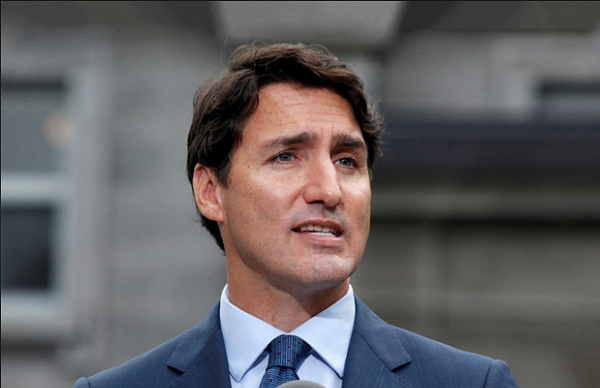Feds to announce initial retaliation plan Monday if Trump proceeds with tariff threats on Inauguration Day
The federal government will unveil proposed retaliatory tariffs on an initial round of American imports Monday if incoming U.S. president Donald Trump uses his inauguration to immediately proceed with threatened levies on Canada.
A government source familiar with Ottawa’s plans says if the U.S. acts, Prime Minister Justin Trudeau would announce a rapid consultation period – possibly two weeks – on a first round of tariffs that would cover approximately $37-billion of U.S. imports, with implementation to follow immediately after.
These would be the least painful countertariffs, the source said, because they would cause the least economic damage to Canadians.
The Globe and Mail is not identifying the source because they are not authorized to publicly discuss these matters.
Depending on how hefty initial U.S. tariffs on Canada are, Mr. Trudeau may also announce consultations on tariffs covering another $110-billion or so of American goods, the source said.
No decisions have been taken yet on other retaliatory measures such as export taxes on goods sold to the United States or restrictions on exports to American customers, the source said. As The Globe has previously reported, Ottawa was considering export taxes on major commodities such as oil, uranium and potash if Mr. Trump proceeds with tariffs.
In November, Mr. Trump first threatened 25-per-cent tariffs on Canada and Mexico unless they took action to stop illegal migration and drug smuggling into American territory. Canada subsequently announced $1.3-billion in new border spending over six years. On Jan. 7, the president-elect suggested that this has not satisfied him. He said drugs are flowing across American borders “in record numbers,” and “we are going to make up for that by putting tariffs on Mexico and Canada. Substantial tariffs.”
Speaking at the end of a visit to Washington Thursday, Natural Resources Minister Jonathan Wilkinson told reporters that he is hearing three tariff plans that Mr. Trump is considering: a 25-per-cent levy on Canadian goods, a 10-per-cent tax for all countries or an escalating tariff that starts low and rises over time.
Mr. Wilkinson acknowledged that Ottawa may not be able to avoid tariffs – which will increase the cost of goods Canadians sell to Americans, and generate millions or billions of dollars in levies for Washington – but said the country needs to establish a “productive and positive conversation” to persuade Washington to withdraw them later. Details of executive orders, or directives, that Mr. Trump’s team are drafting to be issued when he takes office are closely held right now, the minister said.
“The executive orders that are being developed, one or more of which may relate to tariffs, are being done by a relatively small group of people in the White House, and even Republican senators and congresspeople and others who are quite close to the administration do not have a good read on exactly what the nature of a tariff might look like,” he said.
Mr. Wilkinson spent Tuesday and Wednesday in Washington in meetings, including with Republican senators Ted Cruz and Kevin Cramer, GOP House representatives Chuck Fleischmann and Bruce Westerman, as well as Democratic Senator John Hickenlooper.
Separately, B.C. Premier David Eby said Mr. Trump’s tariff threat amounts to “a declaration of economic war” that could erase 124,000 jobs and measurably reduce economic growth in the province, with a cumulative loss of $69-billion in economic activity between 2025 and 2028.
Mr. Eby told a news conference Thursday that he is prepared to inflict a wide array of retaliatory measures against the U.S., including a restriction on overland transport of mainland U.S. goods through B.C. to Alaska.
Alberta Premier Danielle Smith, however, remains at odds with Ottawa over the fact that it won’t rule out export taxes or export restrictions on energy as part of a retaliatory package. She refused on Wednesday to sign a joint declaration from the federal government and the premiers on how to respond to Mr. Trump.
Mr. Trudeau criticized Ms. Smith Thursday and reminded Canadians that Ottawa helped Alberta in 2018 by purchasing the Trans Mountain pipeline.
“At the end of the day, all premiers but one, Danielle Smith, chose to put Canada first and to come together as Team Canada, so that Canada could show a common front against the incoming U.S. administration’s potential unfair practices,” Mr. Trudeau told reporters in Windsor, Ont.
“I would actually like to point out to Danielle Smith that Canadians know the importance of standing up for each other. That’s why Canadian taxpayers bought the Trans Mountain pipeline expansion, to be able to get Albertan oil to new markets.”
Ms. Smith posted on X that a genuine Team Canada approach would include Ottawa putting an end to “threatening the livelihoods of tens of thousands of Albertans & Canadians via an energy export tax or ban.” The Premier said she will be attending Mr. Trump’s inauguration.
Mr. Trudeau also announced Thursday that he has created the Council on Canada-U.S. Relations, comprised of nearly 20 advisers to help him address the tariff threats.
In addition to the 25-per-cent option, Mr. Wilkinson talked of a 10-per-cent tariff reportedly under consideration for all countries, or a more recently discussed rising tariff.
“There’s a discussion that was happening the last few days about tariffs starting lower and then ratcheting up over time,” he said. “I would say it is very unclear, and I think that is probably by design, and we are all going to have to wait to see what happens on the day of inauguration.”
Mr. Wilkinson said Canada is considering imposing tariffs on exports of critical minerals to the United States. He did not specify which critical minerals could be subject to tariffs, but earlier in the week, in a speech in Washington, he stressed how much the U.S. relies on Canada for uranium, potash, germanium, zinc, nickel, copper and graphite.
Conservative Leader Pierre Poilievre, asked during a news conference Thursday whether he would impose export taxes or restrictions on Canadian oil in response to Trump tariffs, did not directly answer the question. He blamed the Liberal government for blocking new pipelines and liquefied natural gas export facilities, leaving Canada reliant on American markets.
“Frankly, the Liberals have got us in this mess by making us beholden to the Americans and giving them, the Americans, our energy at massive price discounts.”
Questioned on whether he supported the Alberta Premier’s refusal to sign on to a Team Canada plan for addressing potential Trump tariffs, Mr. Poilievre again declined to directly answer. He said a Poilievre government would “quickly approve energy projects to send our energy to the rest of the world without relying on Americans, and we will make our country more self-reliant and independent.”
Mr. Wilkinson, when asked if measures beyond tariffs, such as export restrictions or export bans are under consideration, said “nothing was off the table.” He said if the United States proceeds with tariffs, “the response from the government of Canada will look to maximize the pain that is felt by American producers of goods and minimize the concurrent pain that is felt by Canadians.”
Meanwhile, Ontario Premier Doug Ford on Thursday pitched more ideas about his “Fortress Am-Can” plan to further align Canada and the United States as the U.S. seeks to reduce its reliance on China.
The proposals include streamlining regulations to further integrate the automotive and battery-production industries, as well as eliminating the digital-services tax and federal consumer carbon pricing. Mr. Ford said the goal is to produce one million more “Am-Can” vehicles each year by 2028, and to increase steel trade between Canada and the U.S. by 25 per cent in the next three years.
The Ontario government is also looking to expand agri-food trade between Canada and the U.S. as well as cross-border partnerships between postsecondary, industry and union training centres. In addition, Ontario said it wants to harmonize professional certifications to improve access to engineers, doctors and other professional services, and wants more integrated rail, road, marine and air networks between the two countries.
Mr. Ford said Mr. Trump’s threatened tariffs would hurt Canada but would also “really hurt” Americans as well.
“It just doesn’t make any sense at all. We’re stronger together,” Mr. Ford said during a question-and-answer session at the Mississauga Board of Trade.
NDP Leader Jagmeet Singh this week proposed suspending Canadian exports of critical minerals, such as cobalt, to the U.S. as part of a retaliatory response. But Mr. Wilkinson criticized the idea as uninformed and unnecessarily heavy-handed.
Mr. Wilkinson pointed out that Canada is not a major producer of cobalt, and that there are other critical minerals this country produces and exports to the U.S. that are far more strategic.
Earlier in the week, Mr. Wilkinson used the example of germanium as a critical mineral where Canada has far more leverage over the United States. In fact, he proposed teaming up with the U.S. to bolster production of germanium at the Trail complex in British Columbia that is owned by Vancouver-based Teck Resources Ltd. Germanium is used in fibreoptic networks, infrared vision systems and solar panels. Teck is the sole Canadian supplier of germanium to the U.S.
This article was first reported by The Glob and Mail













